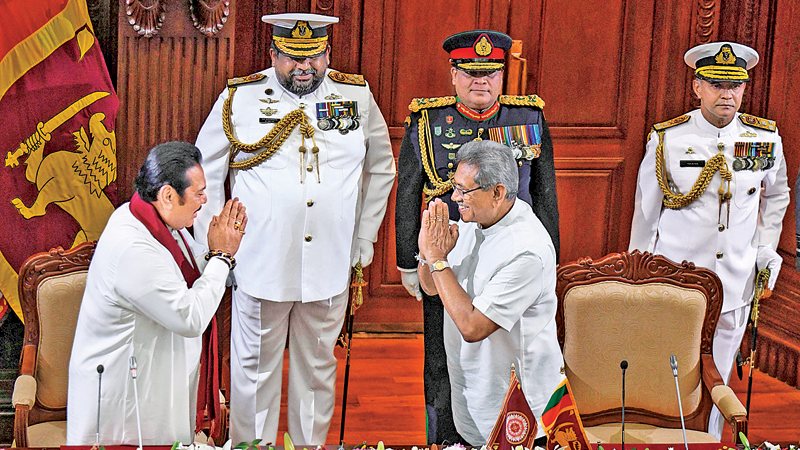Gotabaya Rajapaksa is Sri Lanka’s new president. The former defense minister bested Sajith Premadasa, a serving Cabinet minister who focuses on domestic affairs, in elections last Saturday, riding a nationalist tide that backed his “law and order” platform. The return to power of the Rajapaksa clan could redirect the country’s geopolitical orientation toward China, a potentially important shift given the island’s location astride vital sea lanes. Yet even more important is the prospect of a conservative, Hindu ethno-nationalism returning to guide Sri Lanka’s volatile domestic politics.
Rajapaksa comes from a Sri Lankan political dynasty. His younger brother, Mahinda, was president from 2005 until 2015. During that tenure he ended a bloody 26-year insurgency waged by Tamil separatists. Gotabaya served as secretary of defense in that government and played a critical role in the final assault that ended the rebel campaign. The brutalities of that war, along with allegations of corruption, resulted in Mahinda’s surprise defeat in the 2015 presidential election.
A subsequent constitutional amendment imposed term limits on the presidency, barring the younger Rajapaksa’s return to the office. The family then formed a new political party, Sri Lanka Podujana Peramuna, and ran Gotabaya for president. He prevailed with 52 percent of the vote, a 10 percentage point margin of victory.
Rajapaksa’s win rested on two pillars. The first is overwhelming support from Sri Lanka’s Sinhala Buddhists, who make up 70 percent of the population. They credit the family with ending a savage Tamil insurgency and back its policies that favor the Buddhist community.
The second factor was his campaign pledge to restore law and order. That vow assumed special force after ISIS-inspired militants, despite warnings from foreign intelligence services, in April of this year bombed three five-star hotels and three churches, claiming 277 lives. Rajapaksa promised to restore “discipline” and strengthen national security. That policy will also provide an economic boost: Tourism, vital to the nation’s economy, has been hard hit in the wake of those attacks.
otabaya signaled a readiness to embrace inclusivity, tweeting, “As we usher in a new journey for Sri Lanka, we must remember that all Sri Lankans are part of this journey.” His brother reverted to form, however, promising after the vote that the new government would “deliver justice to all those who have been subjected to persecution and harassment by this government over the past five years.”
Those are not empty words. Rajapaksa is expected to name Mahinda prime minister of a new government, which would allow the brother to follow through on his other pledge to review the previous governmen
In a message following his win, Gt’s April 2015 constitutional amendment that reduced the president’s authority, adopted a more parliamentary system and created independent institutions that would produce checks and balances on those in power.
If the past is any precedent, greater executive authority in the hands of the Rajapaksas is likely to yield intolerance and human rights abuses, especially as the government honors its promise to create order. That portends tension with Western governments, which denounced those practices in the past. Those criticisms pushed the previous Rajapaksa government to reach out to China for support. Beijing was happy to offer funds to increase its influence in Colombo, which, because of its position astride sea lanes, is considered a geopolitical prize. Ironically, that shift led to Mahinda’s downfall, as his family was believed to have pocketed some of that aid.
Since Mahinda was removed from power, Sri Lanka’s Hanbantota port has become a prime example of unfair Chinese lending practices and its debt diplomacy: Unable to repay the loans, the Sri Lankan government gave a Chinese firm a 99-year lease on the facility. That history will likely force Rajapaksa to pursue a more moderate course, which will encourage other governments to balance Beijing’s rising influence.
Japan has made Sri Lanka a priority in recent years; last spring, Tokyo, Colombo and Delhi signed a three-party agreement to develop part of the capital’s port. Earlier this month, the Japan Bank for International Cooperation agreed to provide a 95 percent guarantee on the issuance of $500 million of samurai bonds, the first time Sri Lanka has tried to sell its debt in the Japanese market. Today, Japan holds 10 percent of Sri Lanka’s $55 billion foreign debt, the same amount as China.
With its economy projected by the World Bank to post anemic 2.7 percent growth in 2019 — less than half that of South Asia as a whole — and with imports nearly two times annual exports, Sri Lanka will likely face a debt crisis soon. Restoration of political stability and safety is a first step in dealing with that looming crisis, but it is no substitute for a more sweeping and thoughtful approach.
JT . NOV 21, 2019

